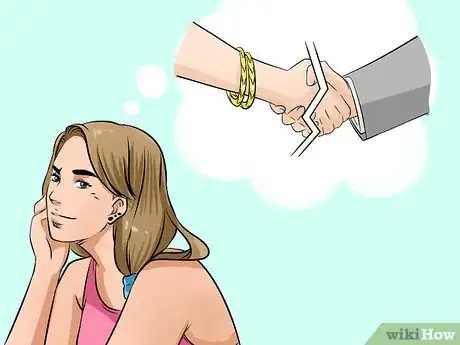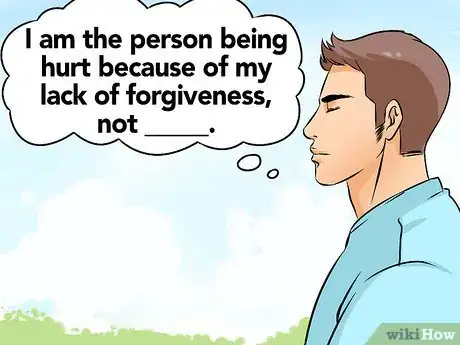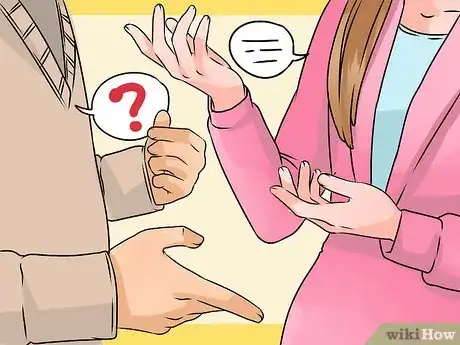This article was co-authored by Trudi Griffin, LPC, MS. Trudi Griffin is a Licensed Professional Counselor in Wisconsin specializing in Addictions and Mental Health. She provides therapy to people who struggle with addictions, mental health, and trauma in community health settings and private practice. She received her MS in Clinical Mental Health Counseling from Marquette University in 2011.
There are 12 references cited in this article, which can be found at the bottom of the page.
This article has been viewed 147,693 times.
Forgiving a person who has broken a promise can be very challenging, especially if the person is a friend, family member, or part of another close relationship. A broken promise may feel like a huge betrayal and you may find yourself feeling very resentful toward the other person. However, holding a grudge has significant psychological and health implications, and when you don't forgive, you’re actually hurting yourself more than the other person. Therefore, it's very important to learn how to forgive others while simultaneously maintaining healthy boundaries.
Steps
Allowing Inner Healing
-
1Accept that the situation has occurred. In order to begin the forgiveness process you have to first accept that the promise was broken. Wishing that things had happened differently or that the person was more reliable only heightens the resentment.
-
2Let go of the anger. When you allow yourself to be angered by the actions of another person, you’re essentially relinquishing some of your own personal power. You cannot change the actions of other people and ruminating over their actions only results in you feeling bad. Make the decision that the broken promise and the promise breaker will no longer have power over you. Here are things that you can do to help release the anger:
- Use affirmations to tell yourself a different story. Try telling yourself aloud several times each day “I need to forgive _____ for breaking their promise.”
- Being mindful and focusing on gratitude and kindness will help to reduce overall anger. When you feel yourself starting to get angry about the empty promise, ask yourself “What am I thankful for today” so that you can re-center yourself before the anger gets out of control.
Advertisement -
3Focus on feeling good. Recognize how bad it feels to hold onto grudges. Notice that the bad feelings are not helping you but are actually making you feel worse.
- Remind yourself out loud that “I am the person being hurt because of my lack of forgiveness, not _____.” Remember, releasing the negative emotions will actually help you begin to feel better.
-
4Release the stress in your physical body. When you are angry with a person it results in your body going into fight-or-flight mode.[1] The mind and body are very connected so when you allow your body to release stress and tension you’ll be in a better frame of mind to forgive. Deep breathing is a great way to de-stress and release anger:[2]
- Sit in a chair with your spine straight. You’ll probably be most comfortable with the back of the chair supporting your back.
- Close your eyes and put one hand on your stomach.
- Slowly inhale by taking in a deep breath. You should feel the breath start in your abdomen and work its way up to your head.
- Slowly exhale. You should feel the breath release from you head and move into your abdomen.
- Repeat this process for five minutes or until you feel calmer.
- This process helps to relieve stress by lowering your blood pressure and slowing your heart rate.
-
5Talk it over with the person.[3] Ruminating thoughts are not healthy and can often lead to increased anger. Let the other person know how you feel and explain how the broken promise negatively impacted your life. This can help you to stop the thoughts from constantly replaying in your head.
- The person who has offended you may not be prepared to apologize for breaking the promise. It’s important for you to be able to forgive and move on even if the other person does not make amends. Forgiveness is not about reconciliation, it’s about releasing the negative energy so that you can feel better.
-
6Reflect on your growth. Every situation is a learning experience. When you’re able to acknowledge that you have learned something from the experience, even if it was the hard way, it makes the actual process of forgiving others easier.
- Make the conscious decision to learn from the experience rather than be bitter about the outcome.
- Ask yourself the question, “What have I learned from this experience?” and take a few minutes to explore the thoughts that come to mind. For example, did you learn to always have an alternative plan?
Letting Go
-
1Practice empathy. Try to see the situation from the other person’s perspective. Sometimes uncontrollable things happen that make breaking promises unavoidable. Alternatively, sometimes people just have impure motives. Either way, when you are able to be empathetic, it’s so much easier to let go of grudges.
- Think about the person’s intentions. Was the person’s intentions good but something happened that caused them to have to abandon the promise?
- Understand that a broken problem is probably not about you. A person who breaks a promise is probably more focused on her own specific internal or external situation and may not realize how much the broken promise impacts you. For example, if someone promised to meet you for an outing and at the last minute bowed out, perhaps it was because she was having car problems or maybe money was tighter than she realized and she was too embarrassed to admit it.
- Remember that everyone breaks promises at some point or another. Think back to a time when you had to break a promise. It didn’t feel good when you had to go back on your word and it probably didn’t feel so great to this person either. Keep in mind that everyone is human and sometimes things happen.
-
2Show compassion even if the person is constantly breaking promises. If the person is a chronic promise breaker, consider what’s going on in the person’s life that makes her constantly go back on her word. Such behavior could be reflective of other chronic things going on in her life that she needs help with. Maybe it's something internal like she has poor boundaries or something external such as marriage problems. Try to experience compassion by considering how she may be actually feeling right now. If you’re still so frustrated about the empty promises that you struggling with this, here are some ways that you can cultivate greater compassion:[4]
- Look for things that you have in common with the person. Maybe you both like the same music or drive the same model car. There are numerous things that you may have in common. Research shows that even something as simple as tapping your fingers to the same rhythm boosts compassionate behavior.
- Don’t blame the other person for your misfortune. Even if her failure to keep her word created a negative result for you, recognize that there were other options available that you chose not to utilize. For example, if you were depending on her to take you to the job interview because your car was in the shop and she did not arrive, keep in mind that you could have made sure that you had a backup plan. Remember, you’re not a victim.
- See the individual as a person and not “a promise breaker.” When you see her as a person who is struggling in some areas you may be more willing to forgive then if you see her as a promise breaker who just doesn’t care.
-
3Recognize the benefits of forgiveness. There are many psychological and physical benefits to allowing yourself to forgive someone who has wronged you. When you are consciously aware that your own well-being actually improves when you let go of grudges, you may be more motivated to move forward with the forgiveness process. Here are some of the benefits of forgiving others: [5]
- Greater psychological well-being
- Decreased depression
- Less anxiety
- Lower levels of stress
- Greater spiritual well-being
- Improved heart health
- Lower blood pressure
- Strengthened immune system
- Healthier interpersonal relationships
- Increased self-esteem and feelings of self-worth
- Research shows that the benefits of forgiveness are so marked because it lowers negative emotions and stress.[6]
-
4Make the decision to forgive. Forgiveness is releasing the desire to seek revenge or ill will toward the person that you feel has wronged you. In addition, when someone has broken a promise, especially if they were close to you, you may experience a sense of loss and grief. Forgiveness is the natural resolution of the grief process.[7]
- Forgiveness doesn’t mean that you’re weak. It's actually a very powerful choice that will ultimately help your well-being.
- Forgiveness does not mean that you have to forget what happened. In fact, it is very important to put up boundaries with people who are not dependable. You can still be friends with someone and not ask them for help.
- Forgiveness does not mean that you have to reconcile the relationship. You can let go of a grudge without maintaining the relationship, if you believe it is unhealthy or toxic.
- Forgiving a person does not mean that you have to condone their actions. Forgiveness is so that you can move on with your life and it doesn’t mean that you have to make excuses for the other person. You can forgive and still take action to protect yourself from future hurts.
-
5Release the grudge. After you have done all of the preparation work, now it’s time to actually let go. Decide whether you want to tell the person directly or if you’d prefer to privately release the grudge.[8] Here are ways that you can express your forgiveness:
- Tell the person that you forgive them. Call the person up or ask to meet with her in person. Take the opportunity to tell her that you are no longer holding a grudge and that you forgive her for breaking the promise.
- If the person is deceased, unavailable, or if you’d prefer to just release the grudge in private, you can verbally express your forgiveness to yourself. Find a quiet place where you will have some privacy. Simply say out loud, “I forgive you, ____.” You can go into as much or as little detail as you feel comfortable.
- Write a letter. This is another great option. You get to decide whether or not to send it or discard it. The point is to give yourself the opportunity to actually release the grudge.
-
6Rebuild trust by establishing boundaries.[9] If you decide to maintain the relationship or if it is a close family member who you will spend a lot of time around, it’s important to safeguard yourself by establishing boundaries. Boundaries will help you rebuild a sense of safety so that the broken promise is less likely to recur. This will help you rebuild trust and begin the process of reclaiming your personal power.
- For example, let’s say that your cousin promised to watch your children so that you could attend an important event but she cancelled at the last minute. One of the boundaries that you could establish is that she give you a 24 hour notice if she has to cancel in the future (assuming there is no emergency) so that you can make other arrangements. You could let her know that if she does not keep this agreement then you will no longer ask her to babysit your children and will no longer be available to babysit her children either.
- Keep in mind that as you begin to reestablish trust, the boundaries may change.
- It’s especially important to set boundaries with chronic promise breakers. Yes, everyone has things that she needs to work through, but you don’t have to allow yourself to repeatedly be taken advantage of while she works through it.
Reconciling the Relationship
-
1Decide if you want to reconcile the relationship. If you think that the relationship is healthy and you want to restore it then make the relationship a priority. Also, make sure you’re ready and not being pressured by what other’s say that you should do.
- Emotions can interfere with the reconciliation process.[10] Make sure you’ve allowed the inner healing to occur before trying to restore the relationship. If you’re still stewing over the broken promise then it can make things even worse.
- There are times when reconciliation is not healthy, and that’s okay. If you don’t think that the relationship should be restored then it’s okay to forgive without restoring the relationship. It may feel a bit awkward but you can say something such as, “I value you as a person and I forgive you, but right now I don’t think it’s healthy for either of us to maintain this friendship.”
-
2Call your friend and tell her that she is appreciated. When restoring a relationship, it’s important that you both feel valued. One of the best ways to show that you truly have forgiven the other person is to show your appreciation of her. Let her know that despite the broken promise, that you still value and respect her and your friendship.
- Here’s an example of what you can say: “I know that we had a disagreement but I want you to know that I value our relationship and want us to remain friends. You are fun to be around, give good advice, and there’s no one else that I’d rather spend a Saturday Girl’s Night with.”
- Try to be as specific as possible when you’re telling her what you appreciate about her. This will make you appear more genuine. Also, humor could be helpful too if appropriate.
-
3Tell the person how you contributed to the problem.[11] Remember, every disagreement has two perspectives. The way that you saw the situation may be slightly different from the way that she saw the situation. Share how you think you could have handled the situation differently.
- Even if the person was the one who broke the promise, consider how you may have contributed to the situation. Being self-aware is important so that you can take responsibility for anything that you may have done to add to the problem.
- Ask yourself questions like “Did I communicate clearly?” “Did I know that she had a lot going on yet I added more to her plate?” “Did I overreact a little?” These questions will help you acknowledge your contribution to the situation. When you share the responsibility for what happened, it helps the other person feel less defensive and the reconciliation process will likely be easier.
-
4Ask her if she wants to salvage the relationship. Allow her the freedom to decide if she wants to save the relationship or not. Don’t assume that because she was the one who broke the promise that she’ll automatically want to reconcile. Keep in mind that although forgiveness is an internal progress reconciliation requires the participation of both people.[12]
- If she is angry respect her right to be angry with you, whether you think it’s legitimate or not. Sometimes people unconsciously project blame onto others. Give her time and continue to think positive.
- She may decide that she doesn’t ever want to reconcile the friendship. If this happens, be prepared to wish her well and continue to forgive.
-
5Spend time together. Be intentional about closing the distance again. Disagreements that result from broken promises can cause a rift in the relationship. Make spending time together a priority to close the distance. Try to be as normal as possible with each other.
- It may take a little time to become close again, and that’s okay. Take it day by day and eventually you’ll get past this rocky period.
Warnings
- Forgiveness is a process and can be hard depending upon the level of perceived betrayal. Don’t beat yourself up if you’re not able to forgive a person who has broken a promise immediately. Give yourself time to go through the grieving process if this is necessary for your situation, but be sure to aim for forgiveness. Remember, forgiveness is for you, not for them.⧼thumbs_response⧽
References
- ↑ http://msue.anr.msu.edu/news/forgiving_and_letting_go_tough_to_do_but_the_benefits_are_many
- ↑ http://www.webmd.com/balance/guide/blissing-out-10-relaxation-techniques-reduce-stress-spot
- ↑ http://greatergood.berkeley.edu/topic/forgiveness/definition
- ↑ http://greatergood.berkeley.edu/topic/compassion/definition
- ↑ http://www.mayoclinic.org/healthy-lifestyle/adult-health/in-depth/forgiveness/art-20047692
- ↑ https://www.theatlantic.com/health/archive/2015/01/the-forgiveness-boost/384796/
- ↑ http://www.pbs.org/thisemotionallife/topic/forgiveness/understanding-forgiveness
- ↑ https://www.psychologytoday.com/blog/mindful-anger/201409/how-do-you-forgive-even-when-it-feels-impossible
- ↑ https://www.psychologytoday.com/blog/in-therapy/200909/four-elements-forgiveness
- ↑ http://www.wsj.com/articles/SB10001424053111903999904576468143132143026
- ↑ http://www.wsj.com/articles/SB10001424053111903999904576468143132143026
- ↑ https://www.psychologytoday.com/blog/in-therapy/201303/forgiveness-vs-reconciliation
- ↑ https://www.theatlantic.com/health/archive/2015/01/the-forgiveness-boost/384796/
- ↑ https://www.theatlantic.com/health/archive/2015/01/the-forgiveness-boost/384796/




























-Step-15-Version-2.webp)

















































